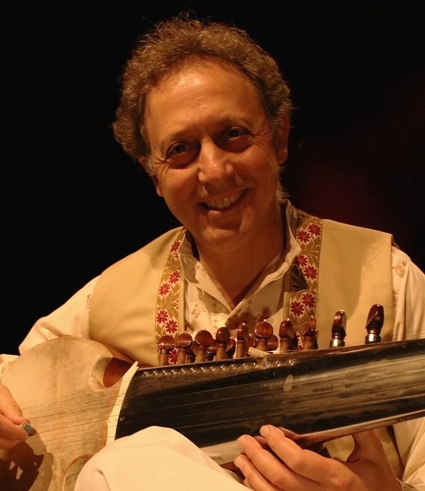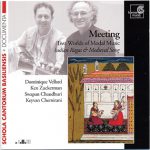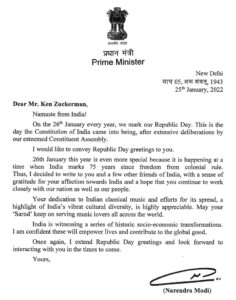Ken Zuckerman, Grammy-nominated and internationally acclaimed as one of the finest sarod virtuosos performing today, has also been called “…one of the world’s most eclectic masters of improvisation.” He completed thirty-seven years of training under the rigorous discipline of India’s legendary sarod master Ustad Ali Akbar Khan, up to the maestro’s passing in June 2009. He also performed with Maestro Khan in numerous concerts in Europe, India, and the United States.

In addition to performing classical Indian music with some of India’s finest tabla virtuosos (Swapan Chaudhuri, Zakir Hussain and Anindo Chatterjee), Ken has been at the vanguard of numerous cultural “crossover” projects. These include the Grammy nominated CD “Diaspora Sefardi” (Hesperion XXI), “Modal Tapestry I & II”, (Zuckerman’s compositions for an ensemble of 14 musicians from diverse traditions), and “Meeting Two Worlds of Modal Music” with the medieval singer, Dominique Vellard. The new CD of this unique collaboration, “Indian Ragas & Medieval Song”, was recently named a “Top of the World” CD by Songlines Magazine.
In recent years Ken has also made significant contributions to the development of India’s traditional instruments through various innovations and inventions. The innovations include:
- The integration of precision geared tuners into the traditional pegs of the sarod and tanpura
- Wooden resonators, which have increased the volume and tonal quality of the sarod
- A sarod bridge add-on which allows for micro adjustments of the bridge placement.
His recent invention, “Shanti”, is the world’s first device which automatically plays an acoustic tanpura, giving both musicians and audiences the pure acoustic sound of the tanpura in any practice and performance setting.
In addition to his extensive performance schedule, Ken Zuckerman has directed the Ali Akbar College of Music in Switzerland for 37 years and is also a professor at the Music Conservatory of Basel where he conducts courses in both North Indian classical music and the music of the Middle Ages.
“In his hands one can hear the essence of the gharana. Ken Zuckerman has been a disciple of the sarod maestro Ustad Ali Akbar Khan, for the last 24 years. Within that period he has risen from a mere curious foreigner interested in fathoming the secrets of the exotic East and its equally exotic musical fare, to being one of the foremost performers of the art.”
– Subhra Mazumdar, The Hindustan Times, Feb.10, 1996
“The impossible becomes achievable when unbounded capacity for hard work is coupled with talent of a high order. Few can hope to plumb the depths of the ocean that is Indian classical music; most barely skim the surface. Listening to Ken Zuckerman on the sarod at the India International Centre, one was humbled by the realisation of just how long and hard he must have worked to provide such aesthetically articulate music. One was awed by the quality of his talent, for boundaries of country, language and custom were swept away by the passion of his determination to master not only a difficult, fretless instrument, but also the mysteries of classical music. Ken has achieved what very few Indians have – become a worthy disciple of Guru Ali Akbar Khan. Surely this is the highest tribute a student can pay a teacher; to prove himself worthy of receiving knowledge and utilising it to the full. It is also the acid test of a Guru, to be able to inspire a disciple to such heights of excellence.”
– Bandana Malhotra The Hindustan Times, Jan.30, 1996
“The maihar touch in his music is not superficial but a product of deep involvement backed up by systematic hard labour. It is this sincerity that makes it difficult to believe that he is not an Indian by birth unless one hears his name or sees him play…Bravo American Sahib!”
– Subroto Roy Chowdhury, Calcutta Asian Age, April 26, 1996
Ken Enthralls
Not since the late John Higgins, dubbed Bhagavathar for the virtuosity in Carnatic music, has a western exponent of Indian music so taken our music world by storm as Ken Zuckerman, whose sarod recitals have the unmistakable touch of a maestro. It is little wonder though, because 39-year-old Ken has been under the tutelage of Ustad Ali Akbar Khan, the sarod maestro, for over 20 years and presently heads the Ali Akbar College of Music in Basel, Switzerland. The Ustad himself calls Ken ‘one of my most gifted students’ and has accorded Ken the honour of performing with him on the same platform. The audience of Dadar Matunga Cultural Centre was a witness to Ken Zuckerman‘s phenomenal handling of the sarod.
Ken started with reposeful alaaps in the mid-afternoon melody, Madhuvanti. From the innate delicacy of his touch, may his very attitude to Hindustani music, it was at once apparent that Ken has assimilated within himself the very ‘soul’ of Ali Akbar’s artistry. Playing with his head down and total concentration (like his Ustad) Ken conjured up the self-same improvisations in an unhurried development of the raga. There was a logical progression of the alap, jod, and jhala followed by a gat set to Teental in which he received understanding support from Aneesh Pradhan on tabla. He followed it up with a Pilu which was marked by imaginative passages reminiscent of the Maihar maestro. The sitarkhani gat was set to Addhataal.
The post-interval session was dominated by a hauntingly beautiful Durga – a raga which has unaccountably, receded into oblivion. Ken’s interpretation of Durga was a rare revelation with a gat set to Roopak and then coupled with a ‘sum-to-sum’ drut composition of Baba Allauddin Khan. Ken concluded his recital with a Mishra Mand which was highlighted by delicate phrasing off innovative swar-sangatis – then he gradually decelerated into a ‘fade out’, but the memory of his concert will endure. Credit equally goes to young Aneesh Pradhan who kept a low profile in his support on tabla. As or Ken, his sarod recital could well serve as a model for our contemporary exponents of the sarod: it was an admirable recreation of the intrinsic values one has cheishe in his Ustad’s sarod baaz – and happily free of present-day gimmickry.
– Sumit Savur, Indian Express Bombay, January 16, 1992






